Alexander the Great and the Ruler Cult in the Hellenistic Period
VerifiedAdded on 2022/12/14
|8
|2566
|144
Essay
AI Summary
This essay delves into the ruler cult in the Hellenistic world, examining its origins, development, and significance. It explores how Alexander the Great's conquests and adoption of Persian customs influenced the concept of rulers being worshipped as gods. The essay analyzes the factors that led to the rise of ruler cults, including the rulers' strength, achievements, and self-perception as divine figures. It highlights the roles of key figures like Ptolemy I and Ptolemy II, and discusses the cult's influence on the Greco-Roman empire, demonstrating how it legitimized monarchy and facilitated communication between rulers and subjects. The essay concludes by emphasizing the ruler cult's importance in the Hellenistic period and its lasting impact on the ancient world, providing a comprehensive understanding of this significant aspect of history.
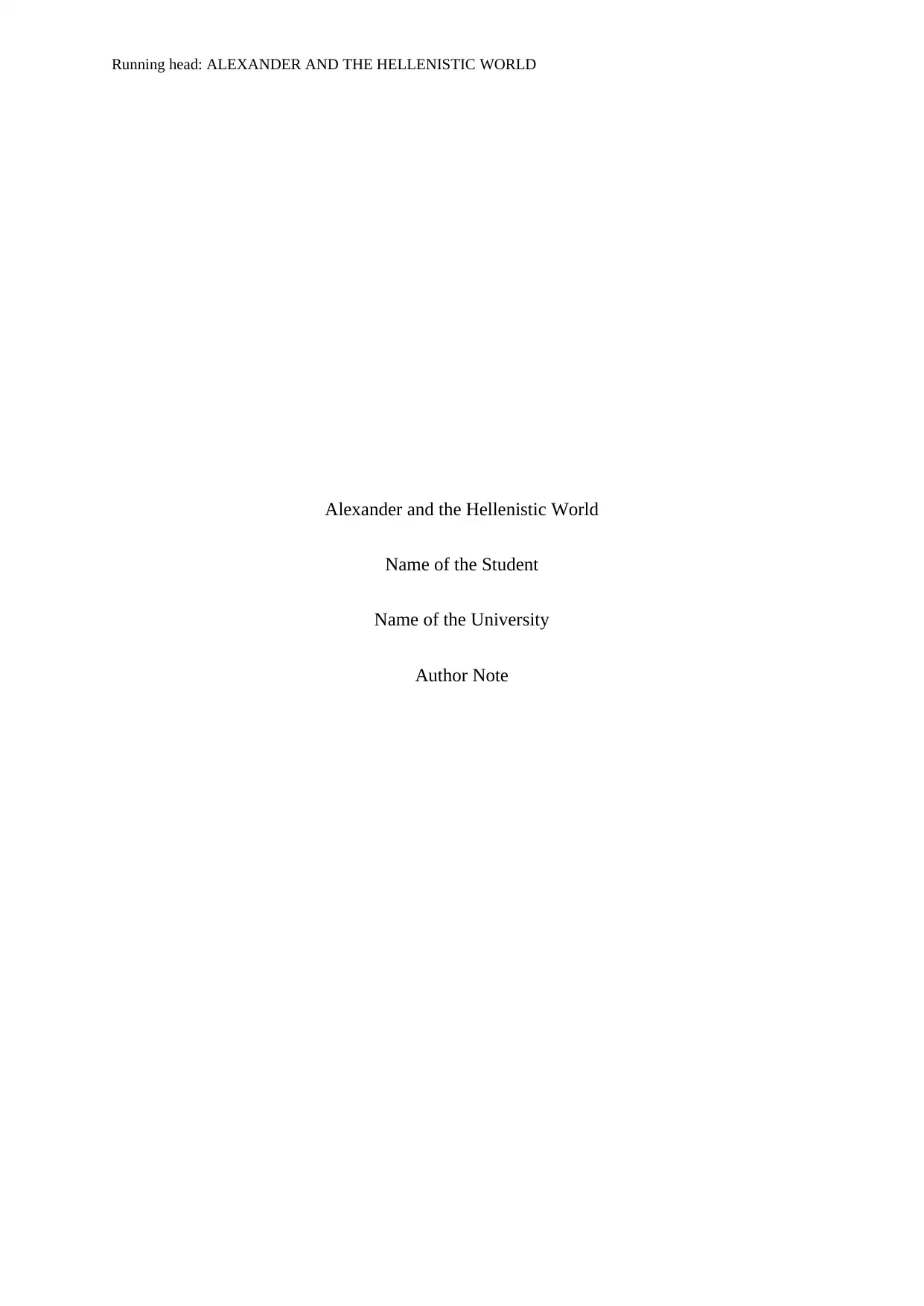
Running head: ALEXANDER AND THE HELLENISTIC WORLD
Alexander and the Hellenistic World
Name of the Student
Name of the University
Author Note
Alexander and the Hellenistic World
Name of the Student
Name of the University
Author Note
Paraphrase This Document
Need a fresh take? Get an instant paraphrase of this document with our AI Paraphraser
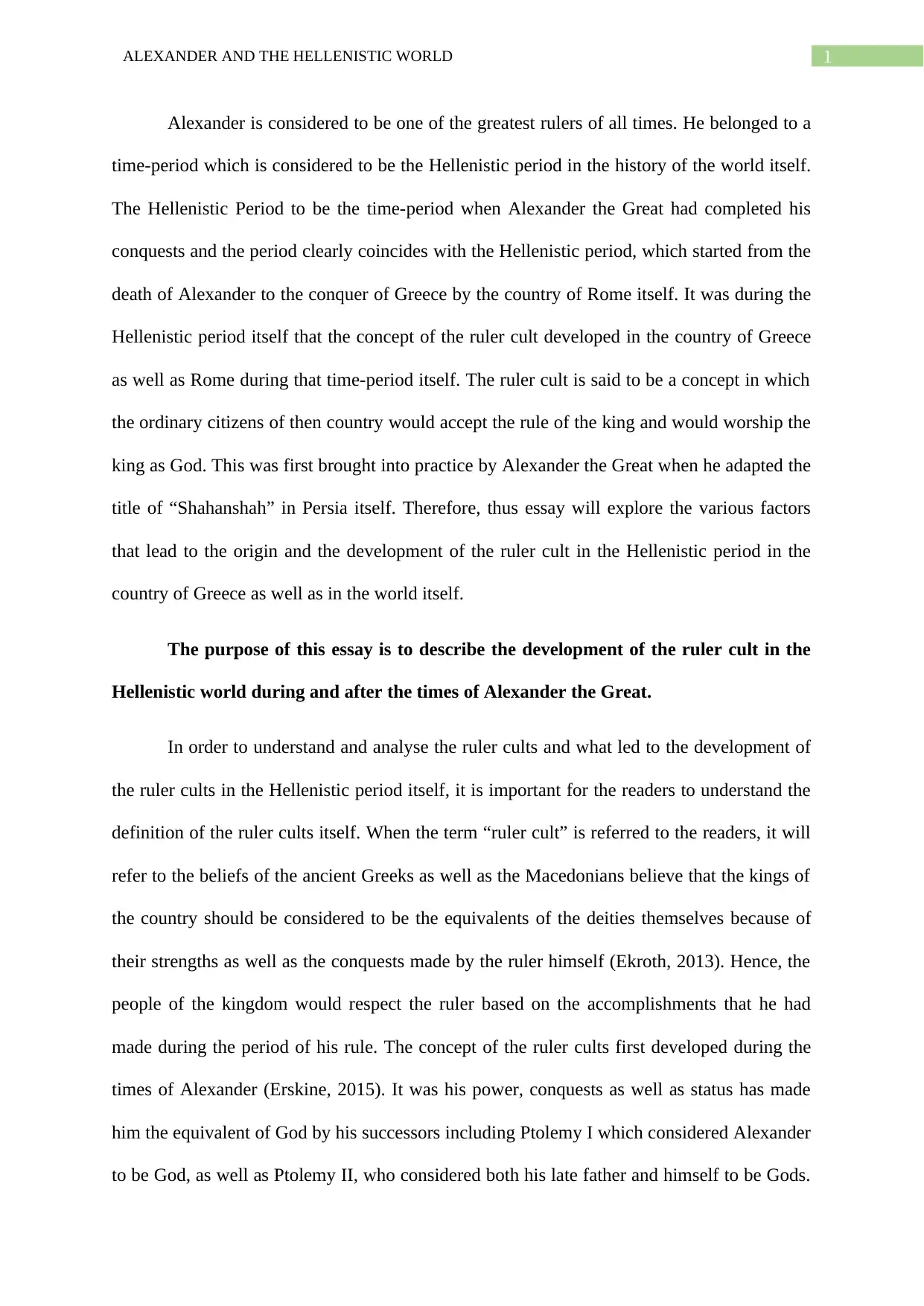
1ALEXANDER AND THE HELLENISTIC WORLD
Alexander is considered to be one of the greatest rulers of all times. He belonged to a
time-period which is considered to be the Hellenistic period in the history of the world itself.
The Hellenistic Period to be the time-period when Alexander the Great had completed his
conquests and the period clearly coincides with the Hellenistic period, which started from the
death of Alexander to the conquer of Greece by the country of Rome itself. It was during the
Hellenistic period itself that the concept of the ruler cult developed in the country of Greece
as well as Rome during that time-period itself. The ruler cult is said to be a concept in which
the ordinary citizens of then country would accept the rule of the king and would worship the
king as God. This was first brought into practice by Alexander the Great when he adapted the
title of “Shahanshah” in Persia itself. Therefore, thus essay will explore the various factors
that lead to the origin and the development of the ruler cult in the Hellenistic period in the
country of Greece as well as in the world itself.
The purpose of this essay is to describe the development of the ruler cult in the
Hellenistic world during and after the times of Alexander the Great.
In order to understand and analyse the ruler cults and what led to the development of
the ruler cults in the Hellenistic period itself, it is important for the readers to understand the
definition of the ruler cults itself. When the term “ruler cult” is referred to the readers, it will
refer to the beliefs of the ancient Greeks as well as the Macedonians believe that the kings of
the country should be considered to be the equivalents of the deities themselves because of
their strengths as well as the conquests made by the ruler himself (Ekroth, 2013). Hence, the
people of the kingdom would respect the ruler based on the accomplishments that he had
made during the period of his rule. The concept of the ruler cults first developed during the
times of Alexander (Erskine, 2015). It was his power, conquests as well as status has made
him the equivalent of God by his successors including Ptolemy I which considered Alexander
to be God, as well as Ptolemy II, who considered both his late father and himself to be Gods.
Alexander is considered to be one of the greatest rulers of all times. He belonged to a
time-period which is considered to be the Hellenistic period in the history of the world itself.
The Hellenistic Period to be the time-period when Alexander the Great had completed his
conquests and the period clearly coincides with the Hellenistic period, which started from the
death of Alexander to the conquer of Greece by the country of Rome itself. It was during the
Hellenistic period itself that the concept of the ruler cult developed in the country of Greece
as well as Rome during that time-period itself. The ruler cult is said to be a concept in which
the ordinary citizens of then country would accept the rule of the king and would worship the
king as God. This was first brought into practice by Alexander the Great when he adapted the
title of “Shahanshah” in Persia itself. Therefore, thus essay will explore the various factors
that lead to the origin and the development of the ruler cult in the Hellenistic period in the
country of Greece as well as in the world itself.
The purpose of this essay is to describe the development of the ruler cult in the
Hellenistic world during and after the times of Alexander the Great.
In order to understand and analyse the ruler cults and what led to the development of
the ruler cults in the Hellenistic period itself, it is important for the readers to understand the
definition of the ruler cults itself. When the term “ruler cult” is referred to the readers, it will
refer to the beliefs of the ancient Greeks as well as the Macedonians believe that the kings of
the country should be considered to be the equivalents of the deities themselves because of
their strengths as well as the conquests made by the ruler himself (Ekroth, 2013). Hence, the
people of the kingdom would respect the ruler based on the accomplishments that he had
made during the period of his rule. The concept of the ruler cults first developed during the
times of Alexander (Erskine, 2015). It was his power, conquests as well as status has made
him the equivalent of God by his successors including Ptolemy I which considered Alexander
to be God, as well as Ptolemy II, who considered both his late father and himself to be Gods.
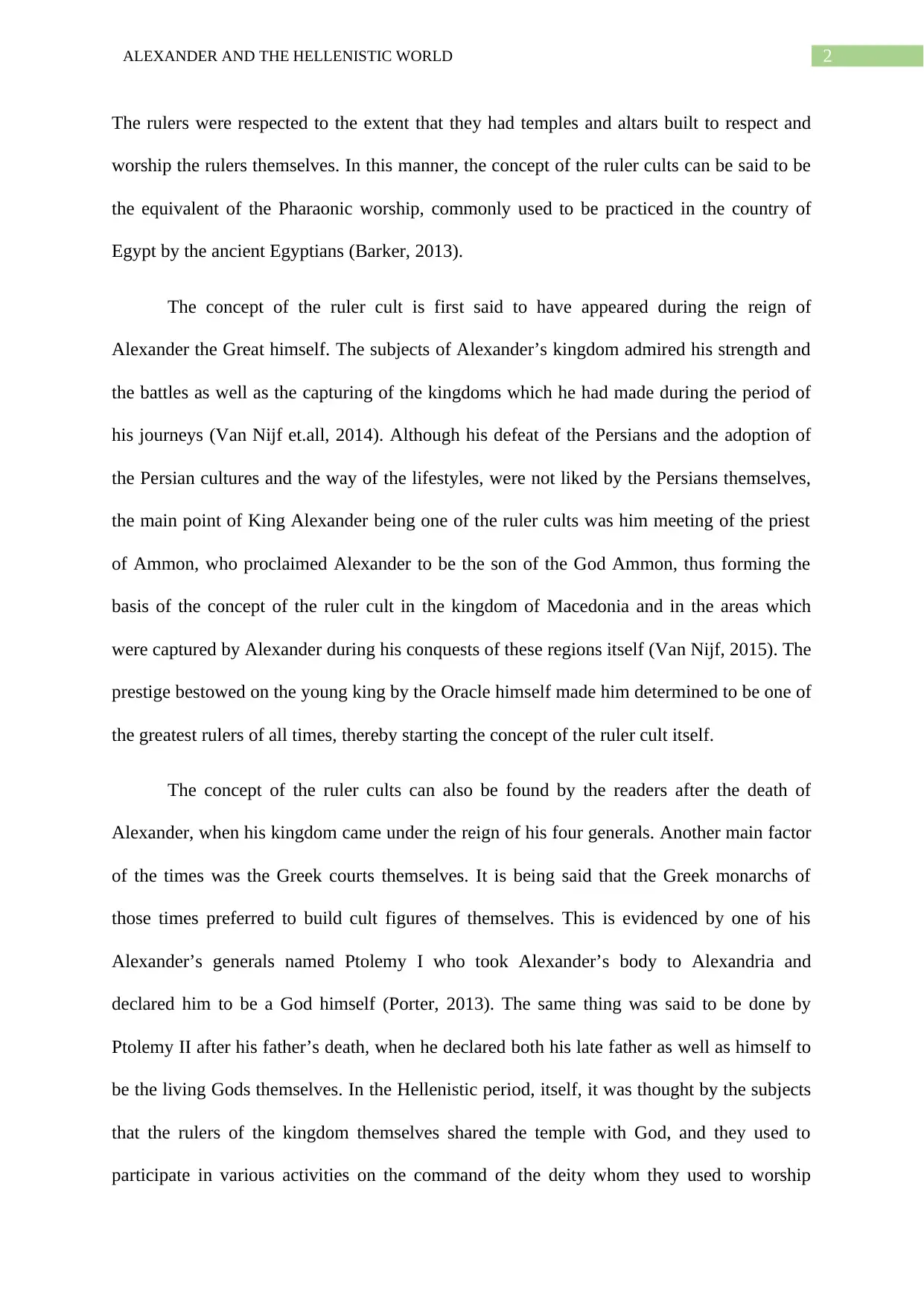
2ALEXANDER AND THE HELLENISTIC WORLD
The rulers were respected to the extent that they had temples and altars built to respect and
worship the rulers themselves. In this manner, the concept of the ruler cults can be said to be
the equivalent of the Pharaonic worship, commonly used to be practiced in the country of
Egypt by the ancient Egyptians (Barker, 2013).
The concept of the ruler cult is first said to have appeared during the reign of
Alexander the Great himself. The subjects of Alexander’s kingdom admired his strength and
the battles as well as the capturing of the kingdoms which he had made during the period of
his journeys (Van Nijf et.all, 2014). Although his defeat of the Persians and the adoption of
the Persian cultures and the way of the lifestyles, were not liked by the Persians themselves,
the main point of King Alexander being one of the ruler cults was him meeting of the priest
of Ammon, who proclaimed Alexander to be the son of the God Ammon, thus forming the
basis of the concept of the ruler cult in the kingdom of Macedonia and in the areas which
were captured by Alexander during his conquests of these regions itself (Van Nijf, 2015). The
prestige bestowed on the young king by the Oracle himself made him determined to be one of
the greatest rulers of all times, thereby starting the concept of the ruler cult itself.
The concept of the ruler cults can also be found by the readers after the death of
Alexander, when his kingdom came under the reign of his four generals. Another main factor
of the times was the Greek courts themselves. It is being said that the Greek monarchs of
those times preferred to build cult figures of themselves. This is evidenced by one of his
Alexander’s generals named Ptolemy I who took Alexander’s body to Alexandria and
declared him to be a God himself (Porter, 2013). The same thing was said to be done by
Ptolemy II after his father’s death, when he declared both his late father as well as himself to
be the living Gods themselves. In the Hellenistic period, itself, it was thought by the subjects
that the rulers of the kingdom themselves shared the temple with God, and they used to
participate in various activities on the command of the deity whom they used to worship
The rulers were respected to the extent that they had temples and altars built to respect and
worship the rulers themselves. In this manner, the concept of the ruler cults can be said to be
the equivalent of the Pharaonic worship, commonly used to be practiced in the country of
Egypt by the ancient Egyptians (Barker, 2013).
The concept of the ruler cult is first said to have appeared during the reign of
Alexander the Great himself. The subjects of Alexander’s kingdom admired his strength and
the battles as well as the capturing of the kingdoms which he had made during the period of
his journeys (Van Nijf et.all, 2014). Although his defeat of the Persians and the adoption of
the Persian cultures and the way of the lifestyles, were not liked by the Persians themselves,
the main point of King Alexander being one of the ruler cults was him meeting of the priest
of Ammon, who proclaimed Alexander to be the son of the God Ammon, thus forming the
basis of the concept of the ruler cult in the kingdom of Macedonia and in the areas which
were captured by Alexander during his conquests of these regions itself (Van Nijf, 2015). The
prestige bestowed on the young king by the Oracle himself made him determined to be one of
the greatest rulers of all times, thereby starting the concept of the ruler cult itself.
The concept of the ruler cults can also be found by the readers after the death of
Alexander, when his kingdom came under the reign of his four generals. Another main factor
of the times was the Greek courts themselves. It is being said that the Greek monarchs of
those times preferred to build cult figures of themselves. This is evidenced by one of his
Alexander’s generals named Ptolemy I who took Alexander’s body to Alexandria and
declared him to be a God himself (Porter, 2013). The same thing was said to be done by
Ptolemy II after his father’s death, when he declared both his late father as well as himself to
be the living Gods themselves. In the Hellenistic period, itself, it was thought by the subjects
that the rulers of the kingdom themselves shared the temple with God, and they used to
participate in various activities on the command of the deity whom they used to worship
⊘ This is a preview!⊘
Do you want full access?
Subscribe today to unlock all pages.

Trusted by 1+ million students worldwide
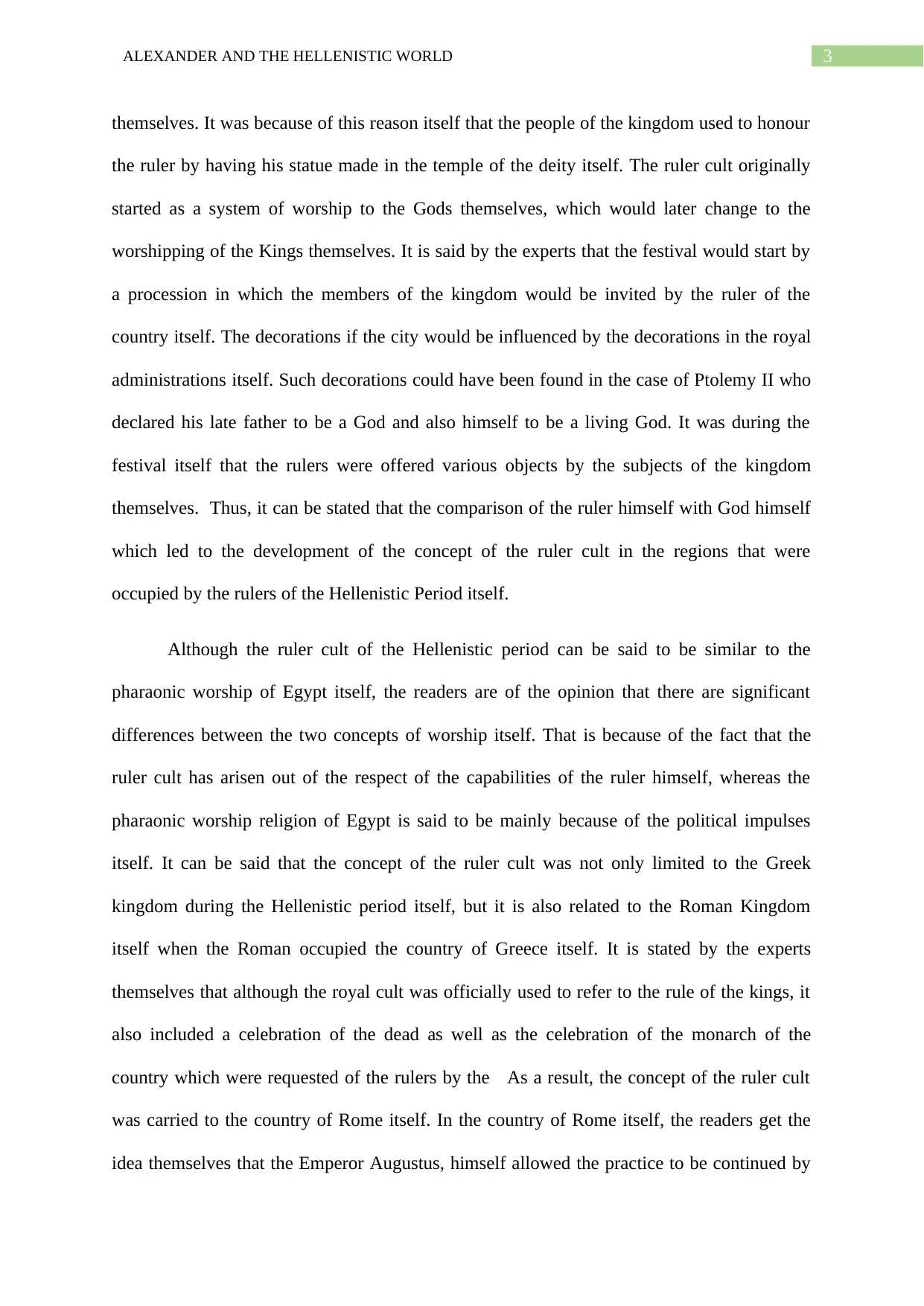
3ALEXANDER AND THE HELLENISTIC WORLD
themselves. It was because of this reason itself that the people of the kingdom used to honour
the ruler by having his statue made in the temple of the deity itself. The ruler cult originally
started as a system of worship to the Gods themselves, which would later change to the
worshipping of the Kings themselves. It is said by the experts that the festival would start by
a procession in which the members of the kingdom would be invited by the ruler of the
country itself. The decorations if the city would be influenced by the decorations in the royal
administrations itself. Such decorations could have been found in the case of Ptolemy II who
declared his late father to be a God and also himself to be a living God. It was during the
festival itself that the rulers were offered various objects by the subjects of the kingdom
themselves. Thus, it can be stated that the comparison of the ruler himself with God himself
which led to the development of the concept of the ruler cult in the regions that were
occupied by the rulers of the Hellenistic Period itself.
Although the ruler cult of the Hellenistic period can be said to be similar to the
pharaonic worship of Egypt itself, the readers are of the opinion that there are significant
differences between the two concepts of worship itself. That is because of the fact that the
ruler cult has arisen out of the respect of the capabilities of the ruler himself, whereas the
pharaonic worship religion of Egypt is said to be mainly because of the political impulses
itself. It can be said that the concept of the ruler cult was not only limited to the Greek
kingdom during the Hellenistic period itself, but it is also related to the Roman Kingdom
itself when the Roman occupied the country of Greece itself. It is stated by the experts
themselves that although the royal cult was officially used to refer to the rule of the kings, it
also included a celebration of the dead as well as the celebration of the monarch of the
country which were requested of the rulers by the As a result, the concept of the ruler cult
was carried to the country of Rome itself. In the country of Rome itself, the readers get the
idea themselves that the Emperor Augustus, himself allowed the practice to be continued by
themselves. It was because of this reason itself that the people of the kingdom used to honour
the ruler by having his statue made in the temple of the deity itself. The ruler cult originally
started as a system of worship to the Gods themselves, which would later change to the
worshipping of the Kings themselves. It is said by the experts that the festival would start by
a procession in which the members of the kingdom would be invited by the ruler of the
country itself. The decorations if the city would be influenced by the decorations in the royal
administrations itself. Such decorations could have been found in the case of Ptolemy II who
declared his late father to be a God and also himself to be a living God. It was during the
festival itself that the rulers were offered various objects by the subjects of the kingdom
themselves. Thus, it can be stated that the comparison of the ruler himself with God himself
which led to the development of the concept of the ruler cult in the regions that were
occupied by the rulers of the Hellenistic Period itself.
Although the ruler cult of the Hellenistic period can be said to be similar to the
pharaonic worship of Egypt itself, the readers are of the opinion that there are significant
differences between the two concepts of worship itself. That is because of the fact that the
ruler cult has arisen out of the respect of the capabilities of the ruler himself, whereas the
pharaonic worship religion of Egypt is said to be mainly because of the political impulses
itself. It can be said that the concept of the ruler cult was not only limited to the Greek
kingdom during the Hellenistic period itself, but it is also related to the Roman Kingdom
itself when the Roman occupied the country of Greece itself. It is stated by the experts
themselves that although the royal cult was officially used to refer to the rule of the kings, it
also included a celebration of the dead as well as the celebration of the monarch of the
country which were requested of the rulers by the As a result, the concept of the ruler cult
was carried to the country of Rome itself. In the country of Rome itself, the readers get the
idea themselves that the Emperor Augustus, himself allowed the practice to be continued by
Paraphrase This Document
Need a fresh take? Get an instant paraphrase of this document with our AI Paraphraser
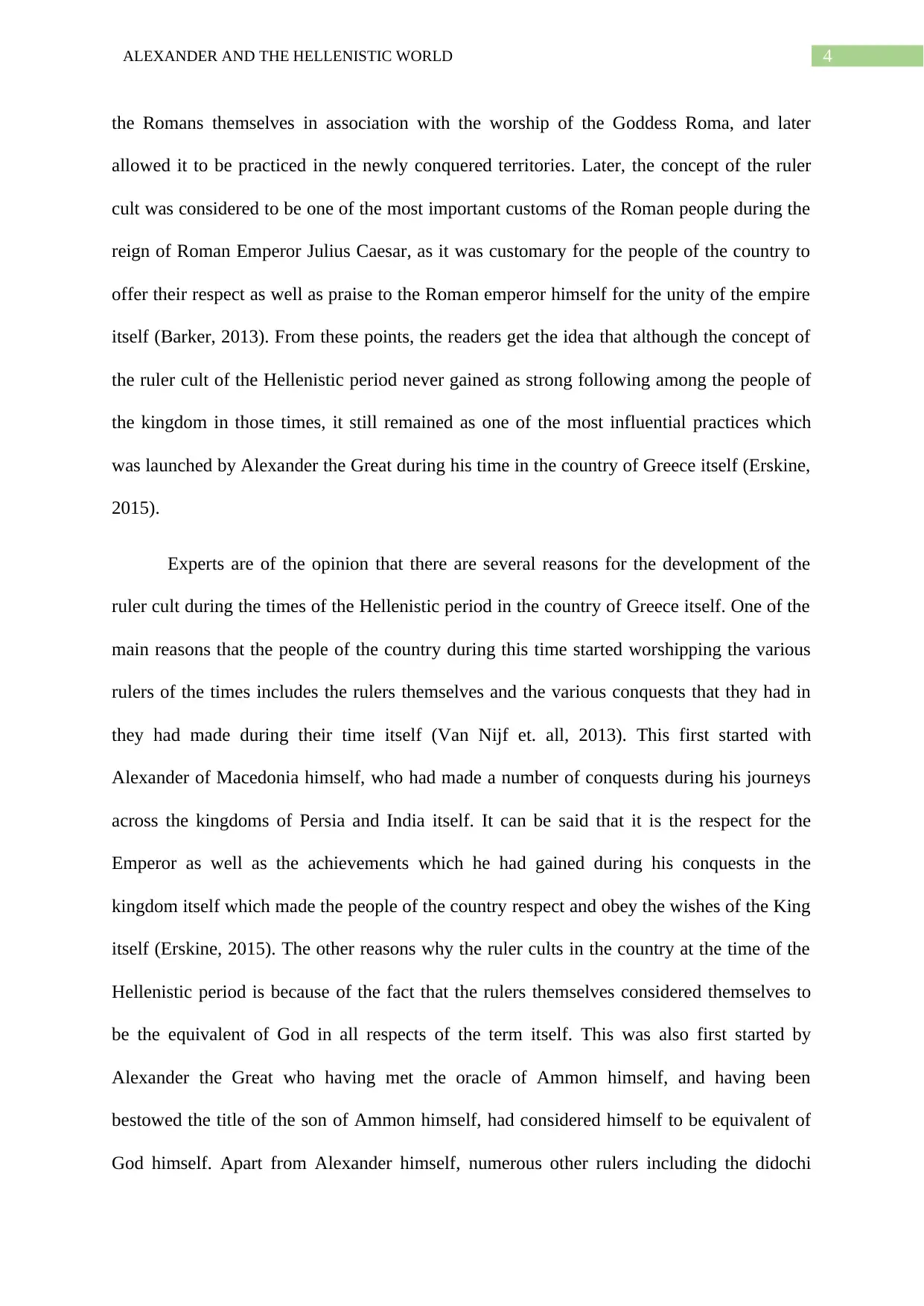
4ALEXANDER AND THE HELLENISTIC WORLD
the Romans themselves in association with the worship of the Goddess Roma, and later
allowed it to be practiced in the newly conquered territories. Later, the concept of the ruler
cult was considered to be one of the most important customs of the Roman people during the
reign of Roman Emperor Julius Caesar, as it was customary for the people of the country to
offer their respect as well as praise to the Roman emperor himself for the unity of the empire
itself (Barker, 2013). From these points, the readers get the idea that although the concept of
the ruler cult of the Hellenistic period never gained as strong following among the people of
the kingdom in those times, it still remained as one of the most influential practices which
was launched by Alexander the Great during his time in the country of Greece itself (Erskine,
2015).
Experts are of the opinion that there are several reasons for the development of the
ruler cult during the times of the Hellenistic period in the country of Greece itself. One of the
main reasons that the people of the country during this time started worshipping the various
rulers of the times includes the rulers themselves and the various conquests that they had in
they had made during their time itself (Van Nijf et. all, 2013). This first started with
Alexander of Macedonia himself, who had made a number of conquests during his journeys
across the kingdoms of Persia and India itself. It can be said that it is the respect for the
Emperor as well as the achievements which he had gained during his conquests in the
kingdom itself which made the people of the country respect and obey the wishes of the King
itself (Erskine, 2015). The other reasons why the ruler cults in the country at the time of the
Hellenistic period is because of the fact that the rulers themselves considered themselves to
be the equivalent of God in all respects of the term itself. This was also first started by
Alexander the Great who having met the oracle of Ammon himself, and having been
bestowed the title of the son of Ammon himself, had considered himself to be equivalent of
God himself. Apart from Alexander himself, numerous other rulers including the didochi
the Romans themselves in association with the worship of the Goddess Roma, and later
allowed it to be practiced in the newly conquered territories. Later, the concept of the ruler
cult was considered to be one of the most important customs of the Roman people during the
reign of Roman Emperor Julius Caesar, as it was customary for the people of the country to
offer their respect as well as praise to the Roman emperor himself for the unity of the empire
itself (Barker, 2013). From these points, the readers get the idea that although the concept of
the ruler cult of the Hellenistic period never gained as strong following among the people of
the kingdom in those times, it still remained as one of the most influential practices which
was launched by Alexander the Great during his time in the country of Greece itself (Erskine,
2015).
Experts are of the opinion that there are several reasons for the development of the
ruler cult during the times of the Hellenistic period in the country of Greece itself. One of the
main reasons that the people of the country during this time started worshipping the various
rulers of the times includes the rulers themselves and the various conquests that they had in
they had made during their time itself (Van Nijf et. all, 2013). This first started with
Alexander of Macedonia himself, who had made a number of conquests during his journeys
across the kingdoms of Persia and India itself. It can be said that it is the respect for the
Emperor as well as the achievements which he had gained during his conquests in the
kingdom itself which made the people of the country respect and obey the wishes of the King
itself (Erskine, 2015). The other reasons why the ruler cults in the country at the time of the
Hellenistic period is because of the fact that the rulers themselves considered themselves to
be the equivalent of God in all respects of the term itself. This was also first started by
Alexander the Great who having met the oracle of Ammon himself, and having been
bestowed the title of the son of Ammon himself, had considered himself to be equivalent of
God himself. Apart from Alexander himself, numerous other rulers including the didochi
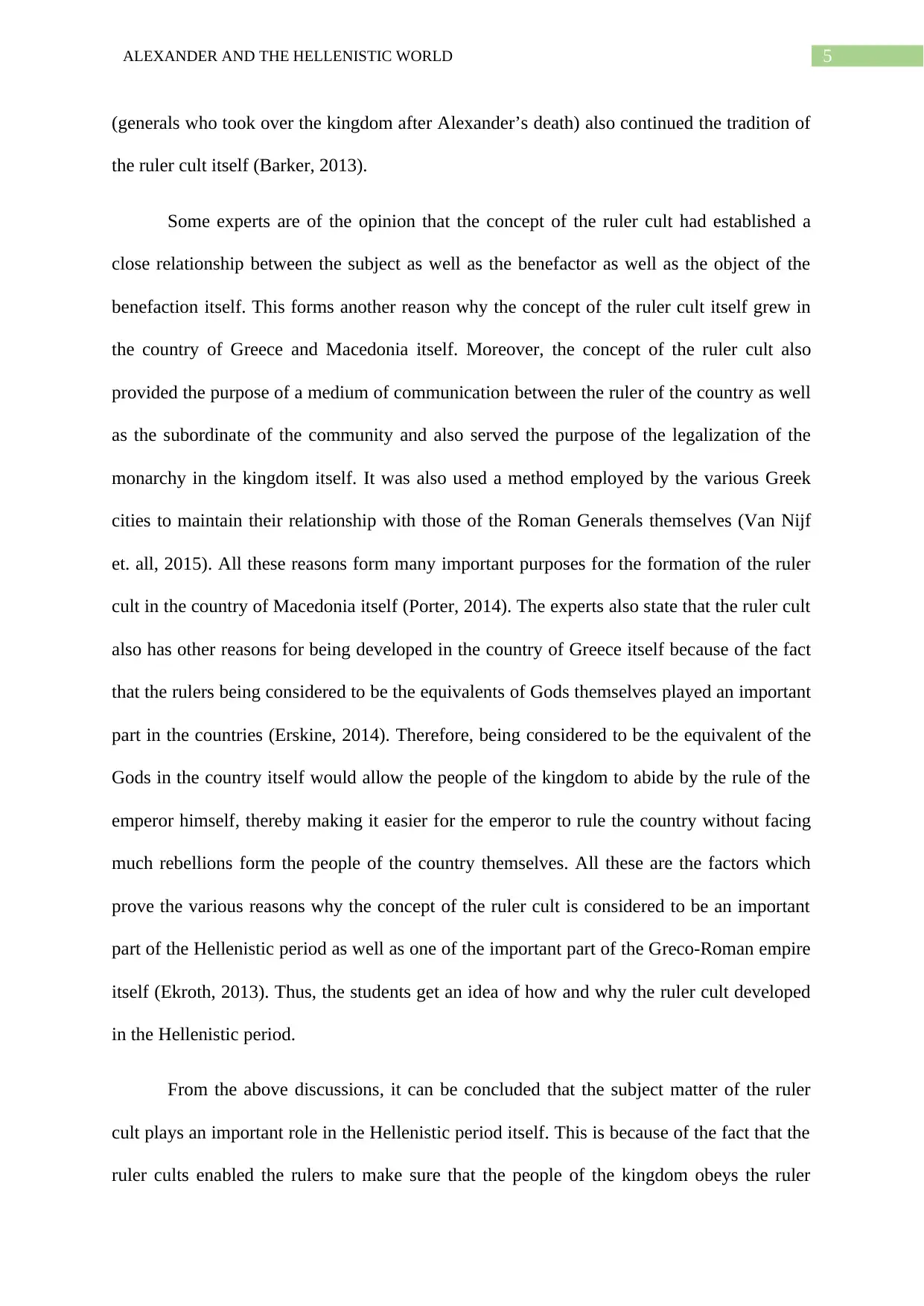
5ALEXANDER AND THE HELLENISTIC WORLD
(generals who took over the kingdom after Alexander’s death) also continued the tradition of
the ruler cult itself (Barker, 2013).
Some experts are of the opinion that the concept of the ruler cult had established a
close relationship between the subject as well as the benefactor as well as the object of the
benefaction itself. This forms another reason why the concept of the ruler cult itself grew in
the country of Greece and Macedonia itself. Moreover, the concept of the ruler cult also
provided the purpose of a medium of communication between the ruler of the country as well
as the subordinate of the community and also served the purpose of the legalization of the
monarchy in the kingdom itself. It was also used a method employed by the various Greek
cities to maintain their relationship with those of the Roman Generals themselves (Van Nijf
et. all, 2015). All these reasons form many important purposes for the formation of the ruler
cult in the country of Macedonia itself (Porter, 2014). The experts also state that the ruler cult
also has other reasons for being developed in the country of Greece itself because of the fact
that the rulers being considered to be the equivalents of Gods themselves played an important
part in the countries (Erskine, 2014). Therefore, being considered to be the equivalent of the
Gods in the country itself would allow the people of the kingdom to abide by the rule of the
emperor himself, thereby making it easier for the emperor to rule the country without facing
much rebellions form the people of the country themselves. All these are the factors which
prove the various reasons why the concept of the ruler cult is considered to be an important
part of the Hellenistic period as well as one of the important part of the Greco-Roman empire
itself (Ekroth, 2013). Thus, the students get an idea of how and why the ruler cult developed
in the Hellenistic period.
From the above discussions, it can be concluded that the subject matter of the ruler
cult plays an important role in the Hellenistic period itself. This is because of the fact that the
ruler cults enabled the rulers to make sure that the people of the kingdom obeys the ruler
(generals who took over the kingdom after Alexander’s death) also continued the tradition of
the ruler cult itself (Barker, 2013).
Some experts are of the opinion that the concept of the ruler cult had established a
close relationship between the subject as well as the benefactor as well as the object of the
benefaction itself. This forms another reason why the concept of the ruler cult itself grew in
the country of Greece and Macedonia itself. Moreover, the concept of the ruler cult also
provided the purpose of a medium of communication between the ruler of the country as well
as the subordinate of the community and also served the purpose of the legalization of the
monarchy in the kingdom itself. It was also used a method employed by the various Greek
cities to maintain their relationship with those of the Roman Generals themselves (Van Nijf
et. all, 2015). All these reasons form many important purposes for the formation of the ruler
cult in the country of Macedonia itself (Porter, 2014). The experts also state that the ruler cult
also has other reasons for being developed in the country of Greece itself because of the fact
that the rulers being considered to be the equivalents of Gods themselves played an important
part in the countries (Erskine, 2014). Therefore, being considered to be the equivalent of the
Gods in the country itself would allow the people of the kingdom to abide by the rule of the
emperor himself, thereby making it easier for the emperor to rule the country without facing
much rebellions form the people of the country themselves. All these are the factors which
prove the various reasons why the concept of the ruler cult is considered to be an important
part of the Hellenistic period as well as one of the important part of the Greco-Roman empire
itself (Ekroth, 2013). Thus, the students get an idea of how and why the ruler cult developed
in the Hellenistic period.
From the above discussions, it can be concluded that the subject matter of the ruler
cult plays an important role in the Hellenistic period itself. This is because of the fact that the
ruler cults enabled the rulers to make sure that the people of the kingdom obeys the ruler
⊘ This is a preview!⊘
Do you want full access?
Subscribe today to unlock all pages.

Trusted by 1+ million students worldwide
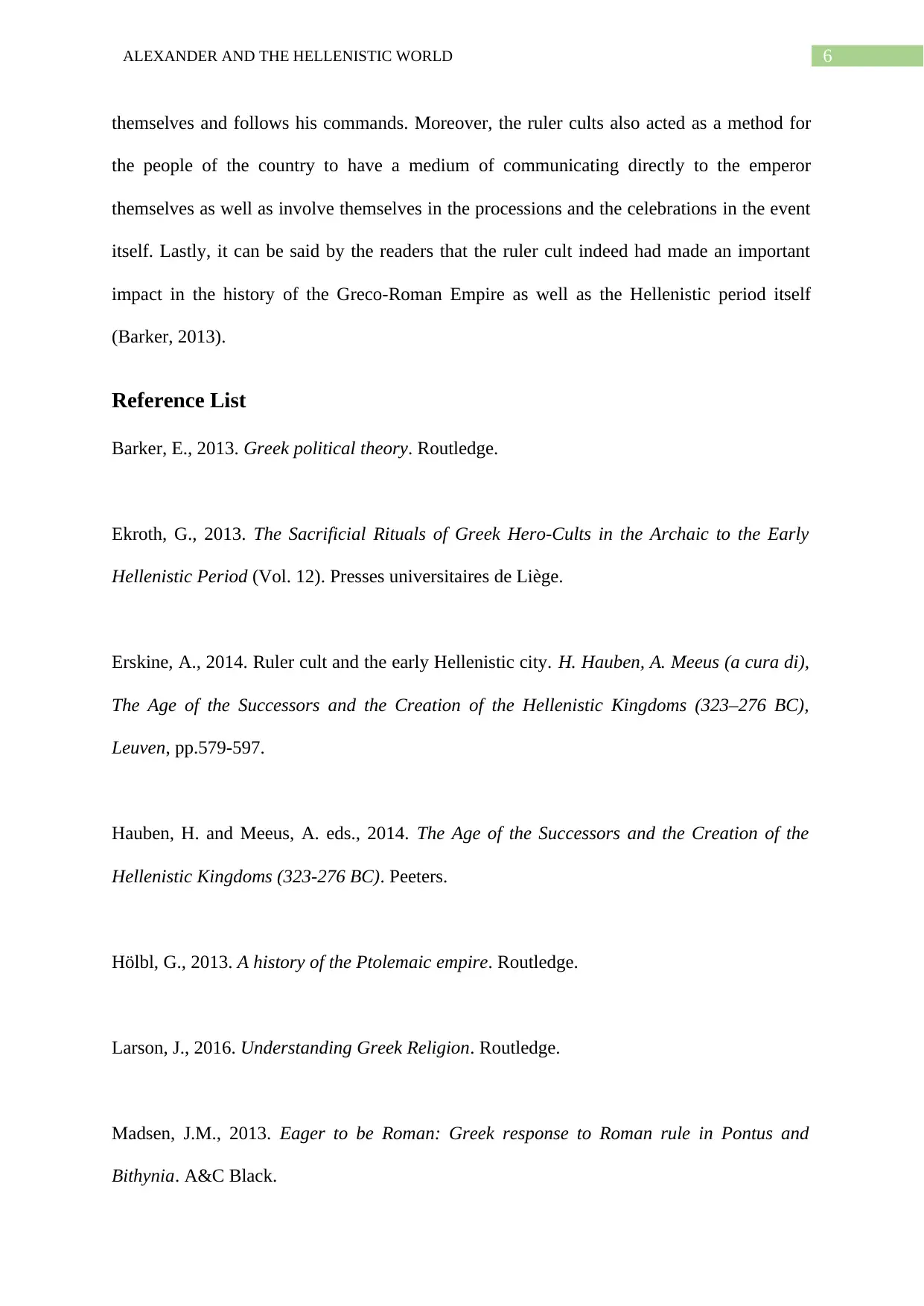
6ALEXANDER AND THE HELLENISTIC WORLD
themselves and follows his commands. Moreover, the ruler cults also acted as a method for
the people of the country to have a medium of communicating directly to the emperor
themselves as well as involve themselves in the processions and the celebrations in the event
itself. Lastly, it can be said by the readers that the ruler cult indeed had made an important
impact in the history of the Greco-Roman Empire as well as the Hellenistic period itself
(Barker, 2013).
Reference List
Barker, E., 2013. Greek political theory. Routledge.
Ekroth, G., 2013. The Sacrificial Rituals of Greek Hero-Cults in the Archaic to the Early
Hellenistic Period (Vol. 12). Presses universitaires de Liège.
Erskine, A., 2014. Ruler cult and the early Hellenistic city. H. Hauben, A. Meeus (a cura di),
The Age of the Successors and the Creation of the Hellenistic Kingdoms (323–276 BC),
Leuven, pp.579-597.
Hauben, H. and Meeus, A. eds., 2014. The Age of the Successors and the Creation of the
Hellenistic Kingdoms (323-276 BC). Peeters.
Hölbl, G., 2013. A history of the Ptolemaic empire. Routledge.
Larson, J., 2016. Understanding Greek Religion. Routledge.
Madsen, J.M., 2013. Eager to be Roman: Greek response to Roman rule in Pontus and
Bithynia. A&C Black.
themselves and follows his commands. Moreover, the ruler cults also acted as a method for
the people of the country to have a medium of communicating directly to the emperor
themselves as well as involve themselves in the processions and the celebrations in the event
itself. Lastly, it can be said by the readers that the ruler cult indeed had made an important
impact in the history of the Greco-Roman Empire as well as the Hellenistic period itself
(Barker, 2013).
Reference List
Barker, E., 2013. Greek political theory. Routledge.
Ekroth, G., 2013. The Sacrificial Rituals of Greek Hero-Cults in the Archaic to the Early
Hellenistic Period (Vol. 12). Presses universitaires de Liège.
Erskine, A., 2014. Ruler cult and the early Hellenistic city. H. Hauben, A. Meeus (a cura di),
The Age of the Successors and the Creation of the Hellenistic Kingdoms (323–276 BC),
Leuven, pp.579-597.
Hauben, H. and Meeus, A. eds., 2014. The Age of the Successors and the Creation of the
Hellenistic Kingdoms (323-276 BC). Peeters.
Hölbl, G., 2013. A history of the Ptolemaic empire. Routledge.
Larson, J., 2016. Understanding Greek Religion. Routledge.
Madsen, J.M., 2013. Eager to be Roman: Greek response to Roman rule in Pontus and
Bithynia. A&C Black.
Paraphrase This Document
Need a fresh take? Get an instant paraphrase of this document with our AI Paraphraser
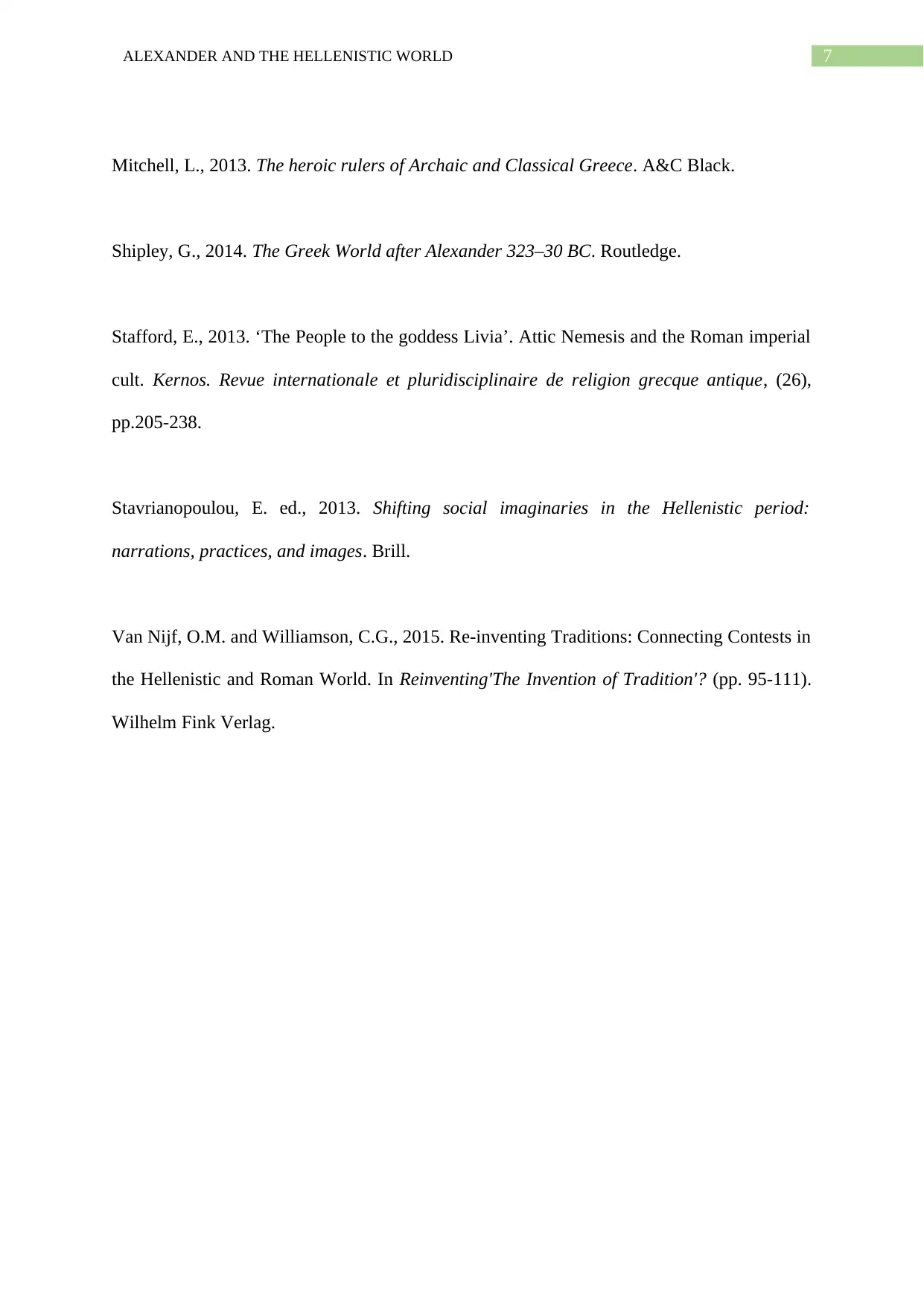
7ALEXANDER AND THE HELLENISTIC WORLD
Mitchell, L., 2013. The heroic rulers of Archaic and Classical Greece. A&C Black.
Shipley, G., 2014. The Greek World after Alexander 323–30 BC. Routledge.
Stafford, E., 2013. ‘The People to the goddess Livia’. Attic Nemesis and the Roman imperial
cult. Kernos. Revue internationale et pluridisciplinaire de religion grecque antique, (26),
pp.205-238.
Stavrianopoulou, E. ed., 2013. Shifting social imaginaries in the Hellenistic period:
narrations, practices, and images. Brill.
Van Nijf, O.M. and Williamson, C.G., 2015. Re-inventing Traditions: Connecting Contests in
the Hellenistic and Roman World. In Reinventing'The Invention of Tradition'? (pp. 95-111).
Wilhelm Fink Verlag.
Mitchell, L., 2013. The heroic rulers of Archaic and Classical Greece. A&C Black.
Shipley, G., 2014. The Greek World after Alexander 323–30 BC. Routledge.
Stafford, E., 2013. ‘The People to the goddess Livia’. Attic Nemesis and the Roman imperial
cult. Kernos. Revue internationale et pluridisciplinaire de religion grecque antique, (26),
pp.205-238.
Stavrianopoulou, E. ed., 2013. Shifting social imaginaries in the Hellenistic period:
narrations, practices, and images. Brill.
Van Nijf, O.M. and Williamson, C.G., 2015. Re-inventing Traditions: Connecting Contests in
the Hellenistic and Roman World. In Reinventing'The Invention of Tradition'? (pp. 95-111).
Wilhelm Fink Verlag.
1 out of 8
Related Documents
Your All-in-One AI-Powered Toolkit for Academic Success.
+13062052269
info@desklib.com
Available 24*7 on WhatsApp / Email
![[object Object]](/_next/static/media/star-bottom.7253800d.svg)
Unlock your academic potential
Copyright © 2020–2026 A2Z Services. All Rights Reserved. Developed and managed by ZUCOL.





